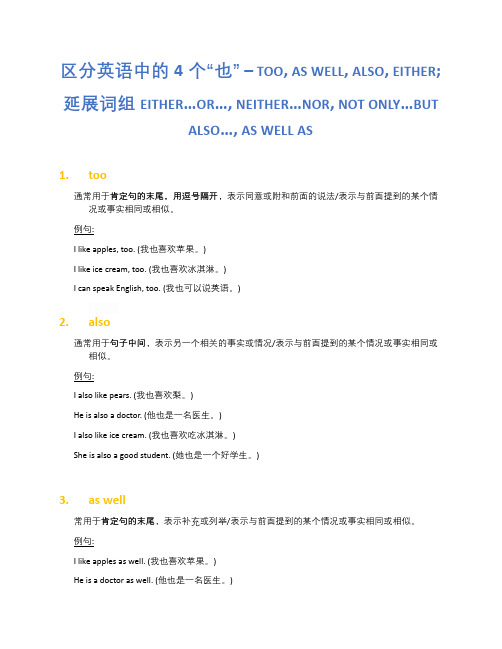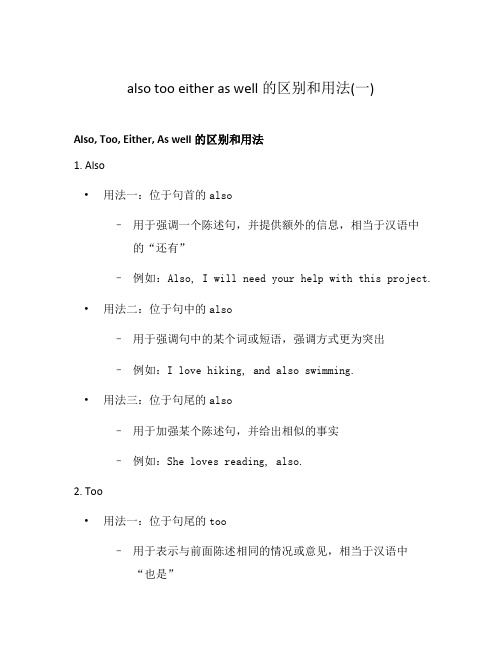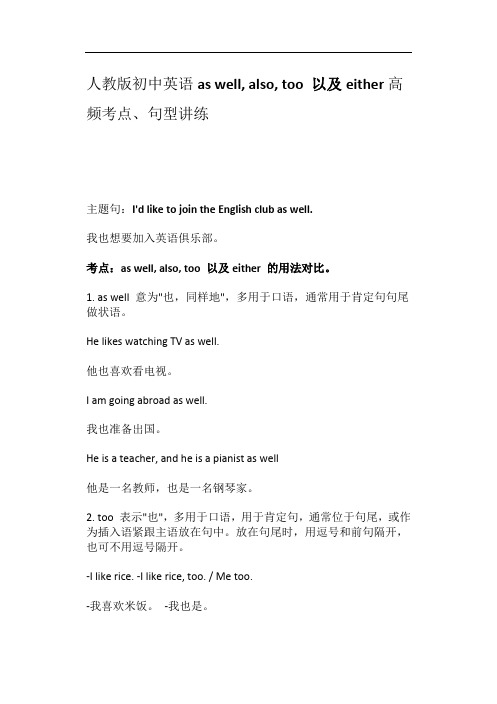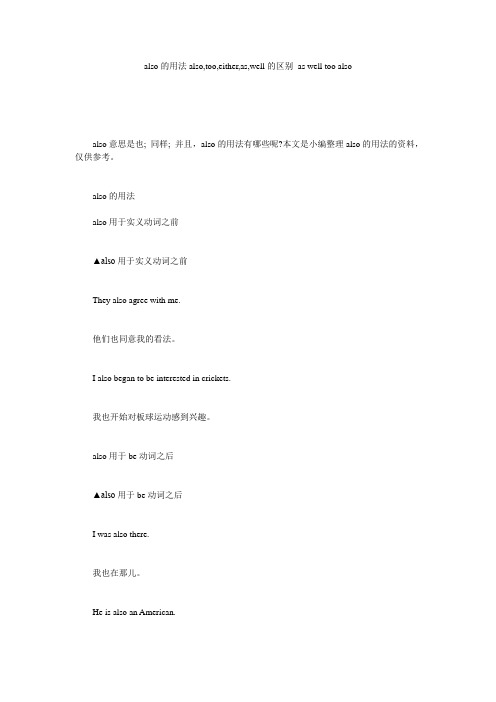tooeitheralsoaswell辨析及练习题
区分英语中的4个“也” – too, as well, also, either

区分英语中的4个“也”– TOO, AS WELL, ALSO, EITHER;延展词组EITHER…OR…, NEITHER…NOR, NOT ONLY…BUTALSO…, AS WELL AS1.too通常用于肯定句的末尾,用逗号隔开,表示同意或附和前面的说法/表示与前面提到的某个情况或事实相同或相似。
例句:I like apples, too. (我也喜欢苹果。
)I like ice cream, too. (我也喜欢冰淇淋。
)I can speak English, too. (我也可以说英语。
)2.also通常用于句子中间,表示另一个相关的事实或情况/表示与前面提到的某个情况或事实相同或相似。
例句:I also like pears. (我也喜欢梨。
)He is also a doctor. (他也是一名医生。
)I also like ice cream. (我也喜欢吃冰淇淋。
)She is also a good student. (她也是一个好学生。
)3.as well常用于肯定句的末尾,表示补充或列举/表示与前面提到的某个情况或事实相同或相似。
例句:I like apples as well. (我也喜欢苹果。
)He is a doctor as well. (他也是一名医生。
)4.either常用于否定句的末尾,表示“也不”。
例句:I don't like apples either. (我也不喜欢苹果。
)Either you or she is responsible for this mistake. (你或者她应该对这个错误负责。
)I don't like either coffee or tea. (我不喜欢咖啡和茶中的任何一种。
)We can either go to the park or stay at home. (我们可以去公园或者待在家里。
)延展词组5.either...or...是一个常用的连词短语,表示二选一的情况。
tooalsoaswelleither的区别

tooalsoaswelleither的区别too also as well either的区别:too作为副词,意为太、过于,用于形容词和副词前;also作为副词,意为而且、也,放在行为动词之前,特殊动词之后;as well意为也、还,常位于句末;either可作代词和副词,意为任何一个、要么要么,常用于否定句,且放句末。
一、too的基本含义及用法介绍too作为副词,意为(用于形容词和副词前)太,过于,过度;也;又;还;(评说某事物使情况更糟)而且。
例句:He's far too young to go on his own.他年纪太小,不能独自一人去。
Can I come too?我也可以来吗?She broke her leg last week─and on her birthday too!她上星期把腿摔断了,而且还是在她生日那一天!I'm not too sure if this is right.这是否正确,我没有太大把握。
二、also的基本含义及用法介绍also作为副词,意为而且;此外;也;同样。
例句:She was not only intelligent but also very musical.她不仅聪明,而且极具音乐天分。
I didn't like it that much. Also, it was much too expensive. 我并不怎么喜欢它。
再说它太贵了。
She's fluent in French and German. She also speaks a little Italian.她的法语和德语讲得流利,也会说一点意大利语。
三、as well的基本含义及用法介绍as well意为也、还。
例句:They sell books as well as newspapers.他们既卖报也卖书。
also too either as well的区别和用法

also too either as well的区别和用法(实用版)目录1.引言2.also, too, either 和 as well 的含义和用法的区别3.also 和 too 的用法4.either 的用法5.as well 的用法6.总结正文一、引言在英语中,副词"also", "too", "either"和"as well"经常被用来表示不同的意思。
尽管它们在某些情况下可以互换使用,但它们之间仍然存在一些关键的差异。
在本文中,我们将详细讨论这些差异以及如何正确使用这些副词。
二、also, too, either 和 as well 的含义和用法的区别1.also:也,用于表示某个观点或行为也适用于另一个观点或行为。
例句:I like apples and I also like oranges.(我喜欢苹果,我也喜欢橙子。
)2.too:也,用于表示强调,通常放在句尾。
例句:I am very tired, too.(我也非常累。
)3.either:(两者之中)任何一个,用于表示两者之间的选择。
例句:You can choose either a book or a magazine.(你可以选择一本书或一份杂志。
)4.as well:也,用于表示某个观点或行为同样适用于另一个观点或行为。
通常放在句尾。
例句:She is a great dancer and a great singer as well.(她是一名优秀的舞者,同时也是一名优秀的歌手。
)三、also 和 too 的用法1.also:用于句中,表示两个观点或行为之间的联系。
例句:He is a talented artist and he also plays the piano.(他是一名有才华的艺术家,而且他也会弹钢琴。
)2.too:用于句尾,表示强调。
Too,also,aswell,either区别1

Too, also, as well, either区别答:too, also, either, as well.这些“也”到底有什么区别呢?我们来看看下面的句子就明白了。
1) too放在句子末尾,通常用逗号隔开。
e.g: I am a student, too.我也是一名学生。
2)either在否定句中使用,但是放在句子末尾,通常用逗号隔开。
e.g: Lucy doesn’t go to the party, either.露西也没有去参加派对。
3) also则放在系动词be之后,实义动词之前。
e.g: I am also a student.我也是一名学生。
Li Ming also takes part in a ceremony.李明也参加了仪式。
4) as well 用在肯定句中,放在句子末尾。
e.g: Tony speaks Japanese as well.托尼也会说日语。
再举个例子:She has knowledge and experience as well.她既有知识,又有经验。
总之,too是肯定句中的“也”,either则是否定句中的“也”,放的位置都在句子末尾;also则是放在句中的“也”;aswell是放在句末的“也”。
【牛刀小试】根据汉语意思完成下面的句子(每空词数不限):1. She speaks French and German and a little Russian.2. I’ve read the book and I’ve seen the film, .3. Mary didn’t go there yesterday, and I didn’t go there, .4. He is going to London and his sister is going .【启发点拨】as well,also,too和either都可表示“也”,它们各自的用法如下:(1) as well常用于肯定句中,且位于句末;(2) also用于肯定句中,通常位于句中;(3) too用于肯定句中,通常位于句末,常用逗号和前面的部分隔开;(4) either多用于否定句中,常位于句末。
also too either as well的区别和用法(一)

also too either as well的区别和用法(一)Also, Too, Either, As well的区别和用法1. Also•用法一:位于句首的also–用于强调一个陈述句,并提供额外的信息,相当于汉语中的“还有”–例如:Also, I will need your help with this project. •用法二:位于句中的also–用于强调句中的某个词或短语,强调方式更为突出–例如:I love hiking, and also swimming.•用法三:位于句尾的also–用于加强某个陈述句,并给出相似的事实–例如:She loves reading, also.2. Too•用法一:位于句尾的too–用于表示与前面陈述相同的情况或意见,相当于汉语中“也是”–例如:I am tired, too.•用法二:位于句中的too–用于强调句中某人或某物和其他人或物一样–例如:He, too, has a dog.3. Either•用法一:位于句尾的either–用于在否定句中表示两种选择中的任何一种–例如:I don’t like tea, either.•用法二:either…or…–用于表示两种选择之间的关系,相当于汉语中的“要么…要么…”–例如:You can either study or play games.4. As well•用法一:位于句尾的as well–用于表示除了前面提到的情况之外,还有另外一项–例如:I like cooking and gardening as well.•用法二:as well as–用于列举一系列事物时,表示“还有…以及…”–例如:He is good at playing soccer as well asbasketball.以上是also, too, either, as well的常见用法及区别。
通过合理运用这些词语,可以使你的表达更加准确明确。
人教版初中英语as well, also, too 以及either高频考点、句型讲练

人教版初中英语as well, also, too 以及either高频考点、句型讲练
主题句:I'd like to join the English club as well.
我也想要加入英语俱乐部。
考点:as well, also, too 以及either 的用法对比。
1. as well 意为"也,同样地",多用于口语,通常用于肯定句句尾做状语。
He likes watching TV as well.
他也喜欢看电视。
I am going abroad as well.
我也准备出国。
He is a teacher, and he is a pianist as well
他是一名教师,也是一名钢琴家。
2. too 表示"也",多用于口语,用于肯定句,通常位于句尾,或作为插入语紧跟主语放在句中。
放在句尾时,用逗号和前句隔开,也可不用逗号隔开。
-I like rice. -I like rice, too. / Me too.
-我喜欢米饭。
-我也是。
as well,either,also,too的区别

as well, either, also, too的区别1.also用于肯定句,既可表示两人干了同样的事,也可表示一个人干了两件事,通常位于be动词,助动词或情态动词之后,行为动词之前。
如:He has been to Beijing. I have also been there.他去过北京,我也去过。
He is good at English. He is also good at Japanese.他擅长英语,也擅长日语。
I also wants some tea.我也要点茶。
注意:表示强调时,also也可放在助动词或情态动词等之前。
比较:I can also do it.我也能干。
I also can do it.(同上)2.too也用于肯定句,比also更通俗,和also, as well可以相互替换,可放在句中,也可放在句末。
如:Xiao Li went to Beijing and Xiao Zhao, too, went to Beijing.小李到北京去了,小赵也到北京去了。
He studies hard and I study hard, too.他学习用功,我(学习)也用功。
3.either用于否定句,而且只能放在句末。
如:He didn’t know it.I didn’t know it either.他不知道那件事,我也不知道。
I can’t speak French and can’t write it, either.我不会讲法语,也不会写法语。
4.as well在口语中用得很多,用法和too完全一样,可以互换,通常位于句末。
[见as well, as well as条]。
如:She not only sings,she plays the piano as well.她不但会唱歌,而且会弹钢琴。
I can do it as well.这事我也能做。
5.在含有责备、抱怨或规劝之类的句子中,若句子本身是以否定的形式表达肯定的意义时用“too”,而不用“either”。
also, too, as well, either的区别、用法及测试题(含答案)

also, too, as well, either的区别、用法及测试题also, too, as well, either中文都有“也”的意思。
also, too, as well都只用在肯定句之中,只是在句中所用的位置不同。
而either只用在否定句之中。
下面是结合例句的详细讲解。
1.also, 用于肯定句中,表示“也”的意思。
如:Jane speaks French. Sam also speaks French.He loves chocolate. I also love pizza.Frank can come with us. Nancy can also come with us.also在句子中的位置,主要有四种情况:(1) 放在be动词之后。
如:I am also Canadian.I was also there.(2) 放在实义(行为)动词之前。
如:I also sing.He also helped us.(3) 放在助动词、情态动词之后。
如:I have also been to Hong Kong.I am also studying economics.I can also speak French.I should also be there.(4) 放在句首,用逗号隔开,表示强调。
如:It’s very humid. Also, you can easily get sunburnt.It is a small house. Also, it needs a lot of repairs.2.too, 用于肯定句中,表示“也”的意思。
如:Jane speaks French. Sam speaks French too.I love chocolate. I love pizza too.Frank can come with us. Nancy can come with us too.too, 在句子中的位置,主要有两种情况。
also, too, either, as well:“也”是有区别的(讲解+练习).doc

also, too, either, as well:“也”是有区别的(讲解+练习)(1)too, as well和also用于肯定句和疑问句,too和as well一般放在句末。
而also一般放在句中与动词连用,either用于否定句和否定的疑问句,往往放在句末。
如:He went there,too. 或者He also went there. 他也去那儿。
He didnt go there,either.他也没去那儿。
I like you as well.我也喜欢你。
(2)顺便提一下:as well as用作连词引出比较从句,其义为“和…一样好”。
因此,“He speaks Spanish as well as English.”应译作:“他说西班牙语像说英语一样好。
”练习:A. Mr. Green can _____speak Chinese well.B. I havent heard from him. She hasnt heard from him, ______.C. I have been to Beijing twice, _____.D. People in Korea celebrate the Spring Festival _____.4. ago,before:“之前”二者意思相似,但用法很不一样。
(1)ago通常和一般过去时态的动词连用,前面是一个表示时间段的词或短语。
如:We started our class about ten minutes ago.我们大约十分钟前开始上课的。
(2)before通常用来表示在某个时间点之前。
如:We started our class before eight oclock.我们八点前开始上课的。
(不能说eight o clock ago)(3)before可以单独用作状语,而ago则不能这样用。
如:I read about it in a newspaper before.我以前在一张报纸上看到过这件事。
as-well-either-also-too的区别

as well, either, also, too的区别用于肯定句,既可表示两人干了同样的事,也可表示一个人干了两件事,通常位于be动词,助动词或情态动词之后,行为动词之前。
如:He has been to Beijing. I have also been there.他去过北京,我也去过。
He is good at English. He is also good at Japanese.他擅长英语,也擅长日语。
I also wants some tea.我也要点茶。
注意:表示强调时,also也可放在助动词或情态动词等之前。
比较:I can also do it.我也能干。
I also can do it.(同上)也用于肯定句,比also更通俗,和also, as well可以相互替换,可放在句中,也可放在句末。
如:Xiao Li went to Beijing and Xiao Zhao, too, went to Beijing.小李到北京去了,小赵也到北京去了。
He studies hard and I study hard, too.他学习用功,我(学习)也用功。
用于否定句,而且只能放在句末。
如:He didn’t know didn’t know it either.他不知道那件事,我也不知道。
I can’t speak French and can’t write it, either.我不会讲法语,也不会写法语。
well在口语中用得很多,用法和too完全一样,可以互换,通常位于句末。
[见as well, as well as条]。
如:She not only sings,she plays the piano as well.她不但会唱歌,而且会弹钢琴。
I can do it as well.这事我也能做。
5.在含有责备、抱怨或规劝之类的句子中,若句子本身是以否定的形式表达肯定的意义时用“too”,而不用“either”。
also, too, as well, either的区别、用法及练习题(附答案)

also, too, as well, either的区别、用法及练习题1.also, 用于肯定句中,表示“也”的意思。
如:Jane speaks French. Sam also speaks French.He loves chocolate. I also love pizza.Frank can come with us. Nancy can also come with us.also在句子中的位置,主要有四种情况:(1) 放在be动词之后。
如:I am also Canadian.I was also there.(2) 放在实义(行为)动词之前。
如:I also sing.He also helped us.(3) 放在助动词、情态动词之后。
如:I have also been to Hong Kong.I am also studying economics.I can also speak French.I should also be there.(4) 放在句首,用逗号隔开,表示强调。
如:It’s very humid. Also, you can easily get sunburnt.It is a small house. Also, it needs a lot of repairs.2.too, 用于肯定句中,表示“也”的意思。
如:Jane speaks French. Sam speaks French too.I love chocolate. I love pizza too.Frank can come with us. Nancy can come with us too.too, 在句子中的位置,主要有两种情况。
如:(1)放在句子末尾,可以用逗号隔开,也可以不用逗号隔开。
如:David is a teacher. His wife is a teacher, too. (用逗号隔开)David is a teacher. His wife is a teacher too. (不用逗号隔开)I can speak French too.I am studying economics too.If he wants to go too, he should meet us at 8:00.(2)插入句子中。
简析also__too__as_well和either用法

简析also, too, as well和either用法also, too, as well, either,作“也”讲,为副词。
下面分别讲述:一. too, also, as well:都用于肯定句,表示前者怎样后者也怎样。
too:一般放在句尾,可用逗号和前面的句子隔开,也可不用;also:其位置大多放在be动词、助动词、情态动词之后,实义动词之前;as well:其位置一般放在句尾,三者可以作同义句转换。
例如:You need to go shopping and I need to go shopping, too.=You need to go shopping and I also need to go shopping.=You need to go shopping and I need to go shopping as well.二. either:用于否定句中,表示前者不……,后者也不……,其位置一般放在句尾。
例如:He doesn’t want any coffee, and I don’t want any, either.You don’t know the way and I don’t know it, either.[巩固训练]选择正确答案:1. He is ___________________ saying, “I don’t want any bread, ___________________.”A. too, alsoB. also, tooC. either, tooD. also, either2. I _________________ study English and Russian.A. tooB. alsoC. eitherD. as well3. Not only the children but ________________ their father is in town.A. tooB. alsoC. eitherD. as well4. John _____________ believes that bears hibernate in winter ________________.A. also, eitherB. too, as wellC. also, as wellD. as well, too5. The foreigner can speak English, he can speak French __________________.A. neitherB. alsoC. eitherD. as well【参考答案】1. D2. B3. B4. C5. D。
also的用法also,too,either,as,well的区别_as well too also

also的用法also,too,either,as,well的区别_as well too alsoalso意思是也; 同样; 并且,also的用法有哪些呢?本文是小编整理also的用法的资料,仅供参考。
also的用法also用于实义动词之前▲also用于实义动词之前They also agree with me.他们也同意我的看法。
I also began to be interested in crickets.我也开始对板球运动感到兴趣。
also用于be动词之后▲also用于be动词之后I was also there.我也在那儿。
He is also an American.他也是美国人。
also用于第一个助动词之后▲also用于第一个助动词之后His sister has also gone to town.他的妹妹也到镇里去了。
The leisure center has also proved uneconomic.休闲中心业已证明利润不大。
also有时放在句首▲also有时放在句子的最前Also, some students were tempted to add written comment of their own throughout the paper. 一些学生也冒险通过论文写出他们自己的评论。
I thought it was the perfect answer. Also, Tony and I had never done a historical subject.我认为它是完美的答案。
而且,托尼和我从没有作过历史科目。
also不能放在句末▲注意:also一定不能放在句子的最后。
参见:《柯林斯COBUILD英语用法词典》但是赵振才教授在他的《英语常见问题解答大词典》中列举了美国英语关于also放在句末的例子。
I must buy some bread also.我还必须买一些面包。
辨析either, also, too, as well 配套课件

either
2. “两者中的任何一个” ---What would you like, tea or coffee? ---Either is OK. ---你想来些什么,茶还是咖啡? ---都行。
also
“也,而且” 通常位于be动词,助动词或 情态动词之后,行为动词之前。 He is also good at Japanese. 他也擅长日语。 I also want some black tea. 我也要点红茶。
The foreigner can speak English, he can speak French ______. A. neither B. also C. either D. as well
即时练习
4. Lily can't sing, ____. A. neither B. also C. either D. as well
辨析either, also, too, as well
either
1. “也” 用于否定句句末。 He didn’t know it. I didn’t know it, either. 他不知道那件事,我也不知道。 I can’t speak French and can’t write it, either. 我不会讲法语,也不会写法语。
I like bananas, too. I also like bananas. I like bananas as well.
转化
I don't want any milk, _____. A. too B. also C. either D. as well
I ____ study English and Russian. A. too B. also C. either D. neither
